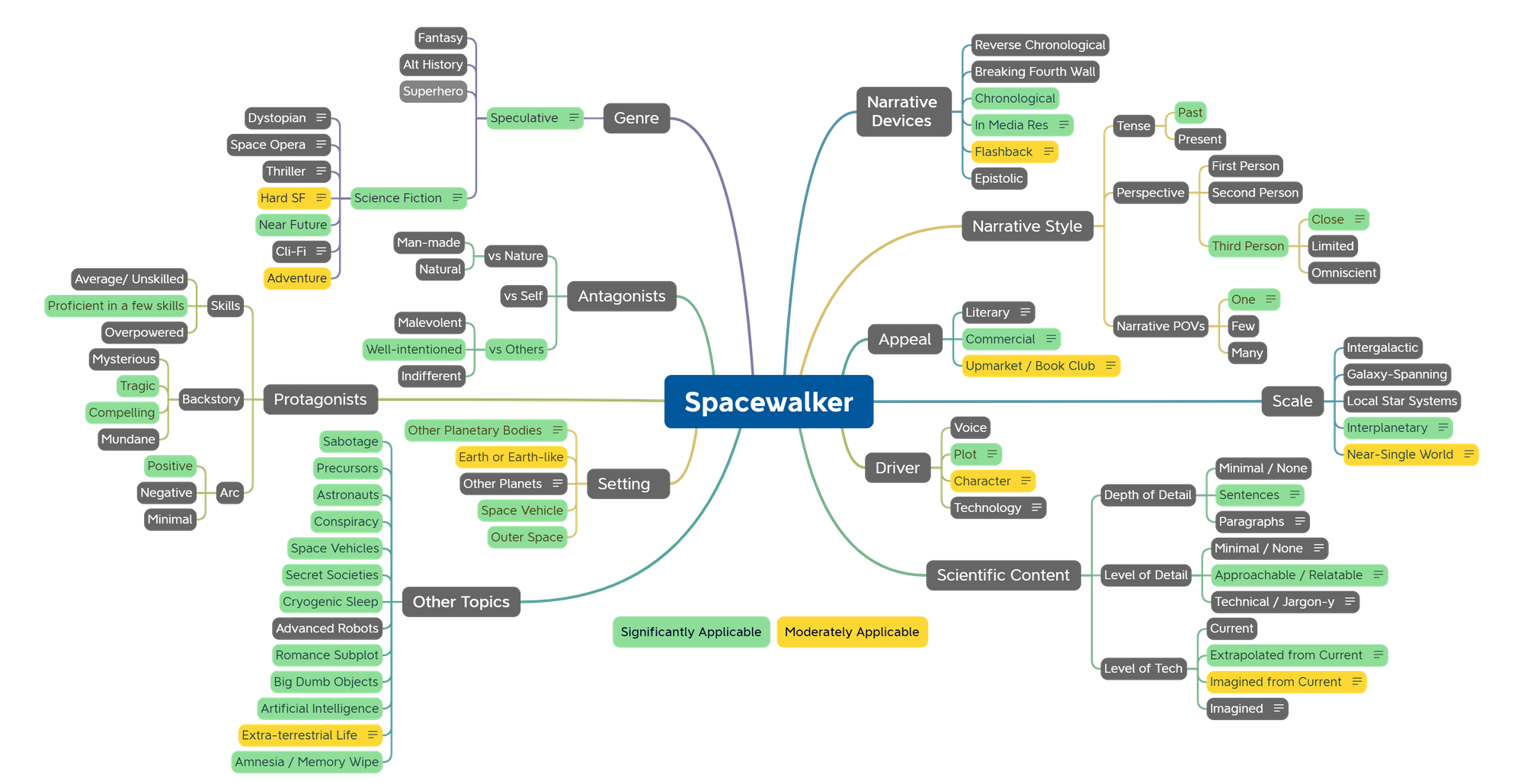Story Taxonomy: Spacewalker
In order to better prepare myself for querying agents, I developed a Story Taxonomy for my novel. Let's skip the preamble and get right to it!

This is the "final for now" diagram, though I'm certain I'll continue to tinker with it going forward. As a reminder, after I broke down each of the major taxonomy topics, I color coded them for applicability with my novel. Green is significantly applicable while yellow is moderately applicable. At a glance, this helps visualize all that Spacewalker is. And isn't.
Mapping to a few of these major categories really gave me pause. As I've mentioned in the past, I don't think about literature the same way an agent might, but I'm learning. Thinking through this exercise was a major help. Let's start with my first stumbling block, the "Driver."
Plot vs Character-Driven
What's the technical definition of a plot-driven story? What about a character-driven story? Simple questions I've never given much thought to. It's a matter of emphasis, right? The former prioritizes intricate plotting and well-orchestrated twists. The latter prioritizes well-rounded characters with satisfying arcs. But if I've endeavored to write both a compelling plot and dynamic characters, then what?
I found this article from Jericho Writers to be particularly helpful.
In a plot-driven story, the focus is on the action and activity surrounding the character, and a well-developed plot with external conflicts that challenge the main characters is crucial. In a character-driven story, the focus will be on the character’s journey – their thoughts, feelings and emotions, and the inner conflict they are experiencing.
Considering the conflict drivers was a new idea for me. I tallied up all of Spacewalker's major conflicts and found more external than internal. That may tend to be the case in any story where the protagonist's survival is continually on the line.
So, Plot-Driven is a more appropriate descriptor for me. However, since I did put so much work into the characters and their arcs, I'm very comfortable saying Spacewalker is "plot-driven with strong characters," and I want to ensure at least one of my comparative titles has similarly strong characters.
Considering Subgenre
One of my other surprising hang-ups was subgenre, and by extension, the level of scientific content in my novel.
When I scanned the list of science fiction subgenres, Near Future naturally stood out to me--after all, Spacewalker's setting is a mere ~30 years in the future with technology not so far off from our own. But it's also common for stories to straddle multiple sub-genres, so I considered every other item on the list carefully. What about Hard SF?
When I compared my work against the harder science fiction I've enjoyed, it became clear to me that there's more to "hardness" than just scientific fidelity. This realization drove the creation of the "Scientific Content" taxonomy topic which consists of three sub-topics: Level of Technology, Level of Detail, and Depth of Detail. Basically, how accurate to reality is the science, how jargon-laden is the exposition, and how long does that exposition run.
The science underpinning my story is sound enough, and in the earliest drafts I sank a lot words into description and jargon-y exposition. With each subsequent revision, I cut that information in favor of conversational explanation or analogies within the narration.
Recently, I finished reading Frozen Orbit by Patrick Chiles which is a great example of much harder science fiction. FO showcased technology not far from our own but presented that technology with with much longer explanations (conversational and narrative), as well as enough jargon to throw me for a loop a few times. It was very well researched, and it all showed up on the page.
By criteria and by direct comparison, Spacewalker clearly falls on the lighter end of the Hard SF spectrum, despite the efforts I put into scientific fidelity and accuracy. As a result, I marked the Hard SF genre as only Moderately Applicable.
Other
You can tell where I ran out of steam. There's a giant category just called "Other Topics!" This is a catch-all for any subjects or tropes I made use of that I'd like to compare against other stories in the future. I may break it down further if there's a need.
Overall, I'm pretty happy with how this exercise turned out. It forced me to think about my novel in ways I never would have otherwise and demystified a few topics along the way. I'm ready to use this as a comparison tool against the novels I've been reading recently.